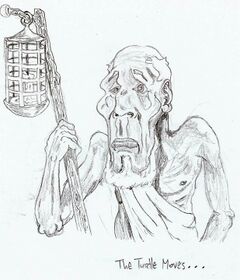Didactylos
| Didactylos | |
 | |
| Name | Didactylos |
| Race | Human |
| Age | Elderly |
| Occupation | Ephebian Philosopher |
| Physical appearance | Elderly, wearing a loincloth, blind |
| Residence | Ephebe |
| Death | {{{death}}} |
| Parents | {{{parents}}} |
| Relatives | {{{relatives}}} |
| Children | {{{children}}} |
| Marital Status | {{{marital status}}} |
| Appearances | |
| Books | Small Gods |
| Cameos | {{{cameos}}} |
Didactylos was (or possibly still is, according to Thief of Time) one of the most notorious philosophers in Ephebe. Unlike most Ephebian philosophers, he did not spend his days lying around in the bath. Indeed, washing in general seemed to completely elude him. He did employ certain other philosophical trappings, such as living in a barrel and carrying a lamp with no oil (as he was blind) - a nicely metaphorical touch. He was the uncle of Urn.
His most famous piece of philosophy was the heretical tract De Chelonian Mobile, or "The Turtle Moves", which formed the basis of an underground movement in Omnia. However, Didactylos himself argued that it wasn't philosophy, as it was entirely factual. His other works include his theory on Life: "Things just happen, what the hell.", as referenced in Hogfather.
He assisted Brutha and Om on their visit to the country.
Annotation
Didactylos' name literally mean "two fingers". He resembles various Roundworld philosophers, notably Diogenes, who also lived in a barrel and carried an oil-less lantern in his fruitless search for an honest man. TP also alludes to aspects of the characters of, the philosophical ideas of, or events from the lives of Plato, Archimedes and Aristotle in his description of Didactylos.
When approached by Omnian soldiers he irritably asks they don't disturb his circles - a reference to the final moments of the brilliant (and real) Archimedes who asked very much the same thing of the invading Romans in Syracuse but was killed by an equally irritable soldier.
"Two fingers" make a V-sign: the ancient two fingered English insult "Piss Off". So Didactylos is well-named.
"Didactic" means "skilled in teaching", so his name may be a double pun on both possible origins of his name, from both his educational prowess and his attitude towards existence.
Didactylos' heretical text is possibly named after the phrase Galileo allegedly muttered after renouncing his view that the earth moved around the sun, "Eppur si muove", or "and yet it moves" (referencing the motion of the earth around the sun)